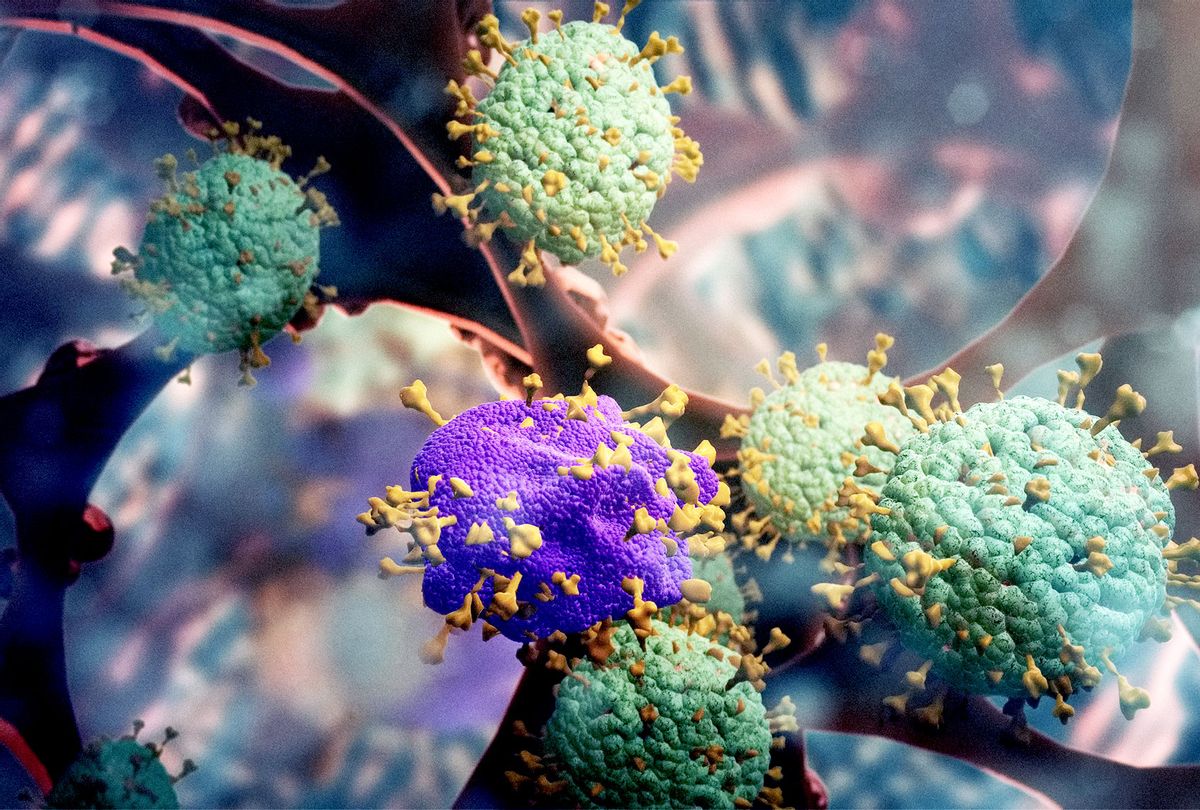Naturally, the coronavirus mutates as it spreads. But scientists are more concerned about some mutations more than others, and there's one in particular that's worrisome because it could throw a wrench in future vaccine efficacy.
Specifically, variant 20C/501Y.V2 — also known as B.1.351 lineage — which has emerged in Durban, South Africa, is alarming because the mutation of the virus is at the SARS-CoV-2 Spike, disguising its appearance to the immune system which can make it easier to bypass immune protection. Think of it like someone putting a wig on to go to a party they weren't invited to, and tricking the bouncer by changing their appearance to enter.
"The concern is that it has a structural change that may change the shape of the Spike protein in a way that it may not be as easily recognized by the immune system, which means the antibodies that we raise through vaccination, as well as naturally occurring antibodies following a following infection," explained Dr. George Rutherford, a professor of epidemiology at the University of California, San Francisco. "That's the concern with that strain."
Dean Blumberg, chief of pediatric infectious diseases and associate professor in the Department of Pediatrics at the University of California, Davis, agreed.
"We need to be immune to that spike protein to prevent infection. If it changes, if it mutates too much, then maybe we might lose immunity that we've achieved via either infection or immunization," Blumberg said.
Variant 501Y.V2 is believed to be behind a fast-growing coronavirus outbreak in South Africa's Eastern Cape Province. Researchers first identified the variant in October 2020 in Nelson Mandela Bay, South Africa. In December 2020, it was also identified in Zambia and appeared to be the dominant strain in the country. According to a preliminary data on the strain, samples of the variant carry up to 9 changes to the spike protein. One mutation of 501Y.V2 that is of concern is N501Y because of how the portion of the spike is mutated. A second mutation, dubbed E484K, appears to have changed the shape of the protein in a way that is making it harder for some antibodies to neutralize the virus.
"There are preliminary studies that suggest that people who've previously been infected with previous strains, they may neutralize the virus up to 10 times less," Blumberg said. "So that's a real concern, and that would suggest that maybe vaccine induced immunity may be escaped by this new variant in South Africa."
Indeed, a paper published about this specific mutation this week echoed those concerns. One author of the paper told STAT News that, despite findings that that the virus was harder to neutralize with antibodies from other strains, the variant would have to have very specific mutations in certain spots to have a big impact on vaccine efficacy.
According to a separate report published this week, scientists tested the Pfizer vaccine against N501Y using blood samples from 20 people. Fortunately, the vaccination worked on them, but the sample size was far too small to say definitively that it would be true for the general population.
Does this strengthen the case that COVID-19 vaccines will be similar to the flu vaccine, in the sense that they will be tailored to different strains and more frequent?
"Maybe yes, maybe no," Rutherford said. "But it would be quite unusual if we had to go in and change it this rapidly."
The Centers for Disease and Control (CDC) has warned that the potential consequence of these mutations could be that these variants could evade vaccine immunity, but that it would not be an immediate impact.
"Both vaccination against and natural infection with SARS-CoV-2 produce a 'polyclonal; response that targets several parts of the spike protein," states the CDC. "The virus would likely need to accumulate multiple mutations in the spike protein to evade immunity induced by vaccines or by natural infection."
Masking and social distancing still work to protect people from this strain, which hasn't been identified in the United States yet. According to the BBC, it has been identified in Austria, Norway and Japan. Notably, there is no evidence to suggest that any of the mutations of this variant cause more serious illness.
"Currently, there is no evidence that these variants cause more severe illness or increased risk of death," the CDC states. "New information about the virologic, epidemiologic, and clinical characteristics of these variants is rapidly emerging."



Shares